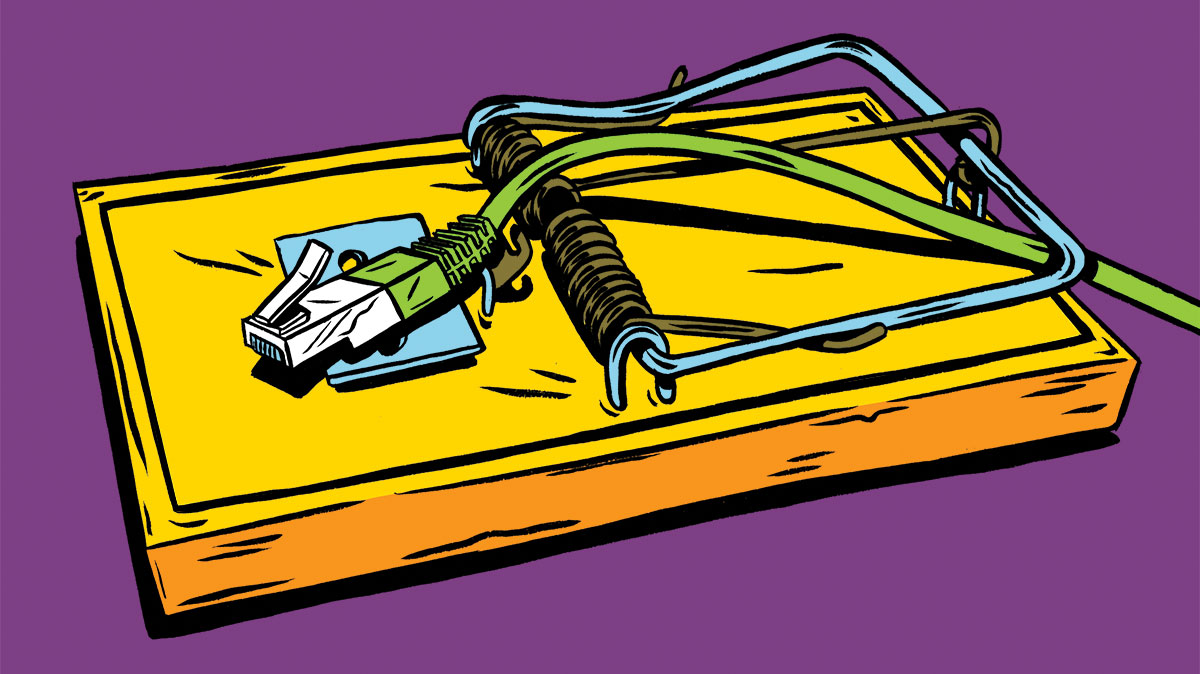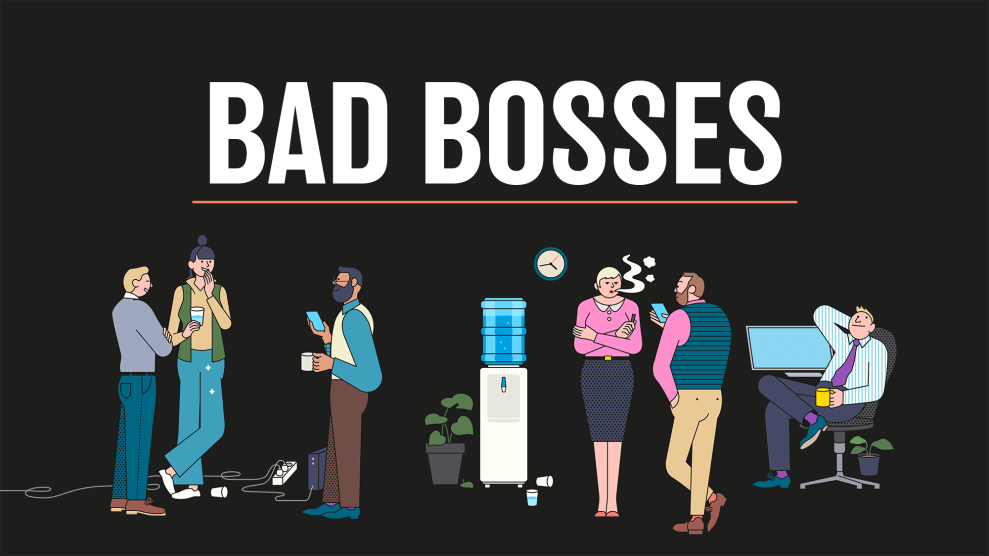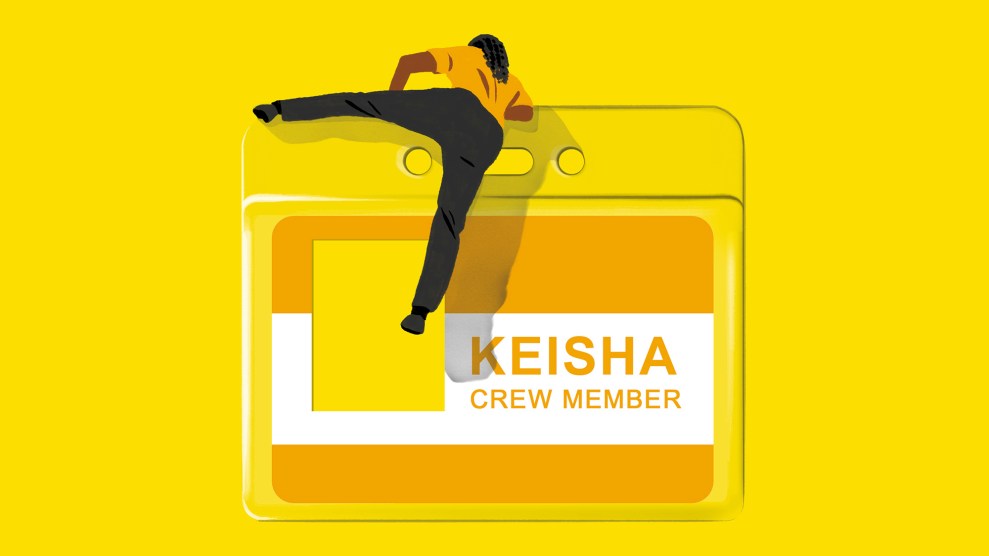In our January + February 2022 cover story, we attempted to answer a simple question: What the hell happened to labor since the pandemic began? It wasn’t one thing. But this package—through a series of worker stories as told in their own voices, interviews with experts, and dissections of media narratives—attempts to make sense of the moment. You can find the full package here.

Chase Roper, 41
Position: Customer Acquisition Executive at Comcast/Xfinity
Started: April 2019
Quit: January 2021
Salary: ~$22.00 per hour, including commission
As told to Molly Schwartz
Chase Roper worked at Comcast/Xfinity selling access to the internet. He sold the internet you want—high-speed broadband—the kind that will let a household of people get on Zoom calls, email photos of their homework assignments, and stream Youtube videos. But that level, now needed in a pandemic, is expensive. A standard, no-frills plan costs a household around $70 to $80 per month.
Convincing customers this more expensive internet package was worth it was a core part of Roper’s job. But when the pandemic hit, getting families to pay more for internet access just felt wrong. They needed it for Zoom classrooms and connecting with family. So, Roper quit. And tweeted about it. “I want to take a stand and have an ethical line for myself,” says Roper of his decision to quit. His message struck a chord. As of publication, his tweet thread had garnered over 182,000 likes and over 44,000 retweets. A Comcast spokesperson said the company has worked “tirelessly to help families stay connected” during the pandemic.
It’s an inbound sales job. It was just nonstop phone calls coming in. I said a lot of the same things to everybody. I had the same opening joke, I had the same stories. Talking to people who want to get the internet only, and talking them into getting other things that they weren’t calling about—that’s what my job was.
Many agents on the phone will tell customers that a tv/internet/landline bundle with a speed of 100mbps thst costs less than an internet only speed of 600mbps will work just as perfect for your household when it won’t. B/c they’ll make triple the $$ on their paycheck.
— Chase Roper (@chase_roper) January 11, 2021
During the pandemic it was very tricky to ask people on the phone how they’re doing. I did have like a couple of occasions where I’d ask someone how their day is going and they just lost a loved one to Covid-19. Or someone’s calling in because the cell phone that their parent has in their nursing home doesn’t work and there’s no phone line activated in that nursing home and they can’t talk to them. So it’s like, how do I ask them a low stakes question about their day when chances are it’s not going good?
I was getting increasingly frustrated with the pandemic, like everybody. I’m very much a person of routine. It just destroyed all of that. I was having a hard time with that. My kids are doing school remotely. I’m stressed about how that’s working. And on top of it all, I’m just getting bombarded with phone calls: “Help, I don’t have internet and I have to work from home,” or “we have internet that is too slow and my kids are getting kicked out of their video for their class, and how do we fix this?” And I have to pitch this person products and sell them things or else I’m going to have a lower paycheck. The pressure was a lot.
I didn’t like how Xfinity/Comcast were positioning themselves as caring and helping and doing everything they can. When I was like, that’s not what you’re doing. It’s business as usual.
They have these special programs for “low income.” The people that qualify typically are low income, but income is not really the qualifier. If you have students or children or dependents on a free or reduced lunch program, if you receive SSI for disability or Medicaid or Medicare, or housing assistance, those are the very common qualifications for the program. Certain school districts are getting it for free for students because of the need for remote learning.
If you are in any of those situations you can apply for the “internet essentials program.” It’s $9.95 per month. The modem is included. You get a 25 megabit per second download speed with a three megabit per second (mbps) upload speed. If you are one individual trying to use the internet at home, maybe watch Netflix, it’ll probably work. If you’re trying to do a live Zoom, three megabits per second is the requirement for that to work. So, if you connect over WiFi, if you’re not right next to the modem, you’re not going to have three megabits per second. Or, if you have multiple people trying to do it—like three kids trying to do it—it’s not going to work.
And you still have a data limit.
Anybody streaming live video for an entire month, five hours a day for school, they’re going to go over that limit and either get charged $10 per every 50 gigs they go over or pay $30 a month to have unlimited data.
It’s not really adequate. So the people who got this program are calling in and trying to get it fixed. And then you would pitch them a package with a slightly higher internet speed, 100 mbps download speed and five mbps upload speed, with a home phone line and access to your local channels on a streaming app: That will come up to $70 a month. Maybe two times out of ten, someone would say well, yeah, let’s do that. But only because they need their kids to do school remote. Most of them will say no, because, newsflash, they really can’t afford it.
If I offer them this $70/month bundle not only am I getting three units on that phone call, which helps my close rate for the day, I’m getting a $30 “Triple Play” bonus for that sale. That’s what you want to sell to people who are looking for a low cost thing. You just have to do it so that you get a good grade on that call.
I felt better about offering that internet essentials option when it was just people at home pre-Covid-19 uploading their assignments through the Google Docs thing—that wasn’t a video stream requirement. Once the need was different and I saw what unequal access to education was going on, I just felt terrible about pitching that. But Xfinity/Comcast was definitely aware that the internet essentials plan wasn’t enough. That was how they wanted us to position the other services to them.
I dreaded getting those phone calls about the low cost plan. I got at least five of those calls a day. If somebody’s trying to reach customer service, they’re going to get a sales rep on the phone. And then we’re going to troubleshoot while trying to pitch them other things for more money. Before we hand them off, we’re gonna see what other meat is on the bone. It’s gross. It just felt gross. I don’t think I’m cut out for sales is what I learned after a year and a half. It’s just not for me. I felt angry. I needed to get out of there. It just felt like a toxic thing to be a part of.
Xfinity/Comcast got rid of data limits for the first two months of the pandemic. Then, I don’t know why, they just got reinstated. The pandemic didn’t end and school didn’t reopen, but they said, now we’re charging everybody again. An email went out that said that the data elements will be back in effect by whatever date. And then they went back in effect.
They put out advertisements that make them look like “heroes” for doing the right thing and helping the “little people.” But it actually isn’t help. It was a good attempt at trying to offer something. But really it’s the absolute bare minimum. And we’re also going to try to milk them for money in every possible way.
Once I got a new job, I didn’t give two weeks. I just said, I’m done, effective today.
Then I saw an ad for that internet essentials program. And I just was mad at it. Because it wasn’t a commercial to let families know about this service. It was an ad to let everybody else know how great Comcast is. They know this doesn’t really work for everybody. It’s not a fix. It’s the absolute bare minimum they can do and charge for it. And I just didn’t like it. And so I was like I’m gonna just tweet about it. Just so everyone knows, this thing they offer, it’s not even enough for most people to have their kids do this schooling.
My wife and I have made less money before. We’re stretching paychecks. But that’s the only stressor. We know we’ll be okay. Ultimately it’ll work out. I’m a big proponent of like, eventually, no matter how hard something gets, you’ll find a new normal, you’ll reach a place where you can become okay again. So don’t future-trip and stress yourself out too hard. Just know, eventually things will feel better than they feel right now.












